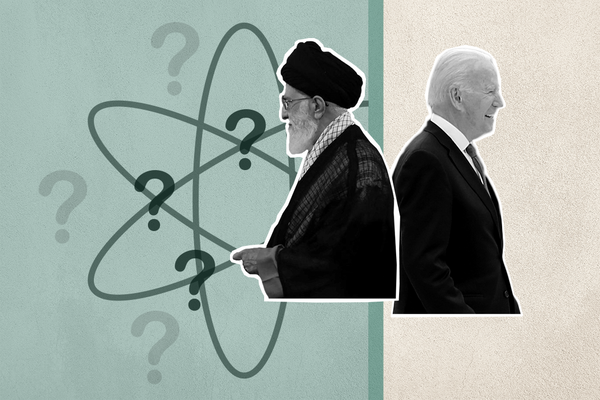US President Joe Biden entered office pledging to return to compliance with the 2015 nuclear agreement, provided Iran did the same. His predecessor Donald Trump walked away in 2018 from the deal, which placed limits on Iran's nuclear program in exchange for relief from economic sanctions. But Biden's goal of resurrecting it now seems to be slipping out of reach. We spoke with Henry Rome, a director at Eurasia Group focusing on Iran, about what to expect in the coming weeks and months.
What is the current state of affairs?
Talks to revive the 2015 agreement have been on hold since the end of June, when Iran held its presidential election. The negotiations had made progress toward an agreement, and many thought a deal could have been secured over the summer. But Iran, led by new President Ebrahim Raisi, has delayed a return to talks and sent a consistent stream of negative signals about its interest in the agreement, such as appointing a strident opponent of the deal as the lead negotiator. The talks will resume on November 29th in Vienna, but the outlook does not look promising.
The limbo in the negotiations would not be as big of a concern if Iran wasn't also rapidly advancing its nuclear program. But Tehran has made a number of notable steps in recent months, including enriching uranium to a level it has never before reached and experimenting with next-generation models of centrifuges. These steps reduce the amount of time it would take Iran to accumulate enough nuclear material for a bomb. Iran is gaining experience and confidence in different techniques, which cannot be erased. That puts the complex set of compromises that undergird the nuclear accord at risk.
What are the main sticking points in the talks to date?
The US and Iran share a common goal: to return to full compliance with the deal. But they don't agree about what compliance actually looks like. The fundamental trade at the core of the agreement — sanctions relief in exchange for nuclear constraints — has become more tricky since Trump withdrew from the agreement in 2018, because the US has layered on more sanctions and Iran has built up its nuclear infrastructure since then. The parties are trying to roll back the clock three years, but this is harder than it sounds.
The US and Iran have also made demands that go beyond the scope of the original agreement. Iran has called for relief from all sanctions imposed by Trump, even those that would have been permitted if the nuclear accord had been in place. It also wants a guarantee that no future president can withdraw from the agreement and mechanisms to verify sanctions relief. For its part, Washington has called on Tehran to commit to holding follow-on negotiations to improve and expand the agreement, although it has publicly downplayed this demand in recent months.
Given the state of the Iranian economy, why is Tehran not more eager to obtain sanctions relief?
US economic sanctions have cut off Iran from the international financial system and hurt its ability to sell oil, engage in trade, and court foreign investment. The Iranian economy has achieved modest growth coming out of the pandemic, but inflation remains very high at 39 percent, and the currency is volatile. The nuclear deal would certainly not solve all of Iran's problems, but it would deliver a powerful, positive impulse to the economy.
Iran's hawkish new government views the deal differently. It underestimates the economic benefits of the agreement, based on disappointment from the previous period of sanctions relief, and likely overestimates its own ability to muddle through without it. Iran's new economic team aligns with Supreme Leader Ali Khamenei's desire to create a "resistance economy" that sees "neutralizing" sanctions by building up domestic capabilities as more productive than negotiating sanctions relief.
What will this mean for US (and Israeli) policy toward Iran and the wider Middle East?
By focusing on reviving the nuclear accord, the Biden administration hoped to avoid precisely the scenario it now faces: an unconstrained Iranian nuclear program that demands attention and distracts from the US's attempts to focus on Asia and what it sees as the dangers posed by an increasingly powerful and assertive China.
If the nuclear talks break down, the US will begin taking a more coercive approach, including applying new sanctions to the Iranian economy and ramping up diplomatic pressure, including potentially at the UN Security Council. Israel, which feels particularly at risk given Iran's threats to destroy the Jewish state, will likely take more aggressive steps to try to degrade the nuclear program and challenge regime stability, such as sabotage, although direct Israeli bombing of Iranian sites is still unlikely.
Henry Rome is Senior Analyst, Global Macro at Eurasia Group.- Is the Iran nuclear deal dead – again? - GZERO Media ›
- To deal with Iran's nuclear program, diplomacy is the only safe ... ›
- The US can’t let Iran get any closer to nuclear weapons, says Iran expert Ali Vaez - GZERO Media ›
- Iran nuclear deal 2.0, or war? - GZERO Media ›
- Iran nuclear deal now a toss-up, says International Crisis Group expert - GZERO Media ›
